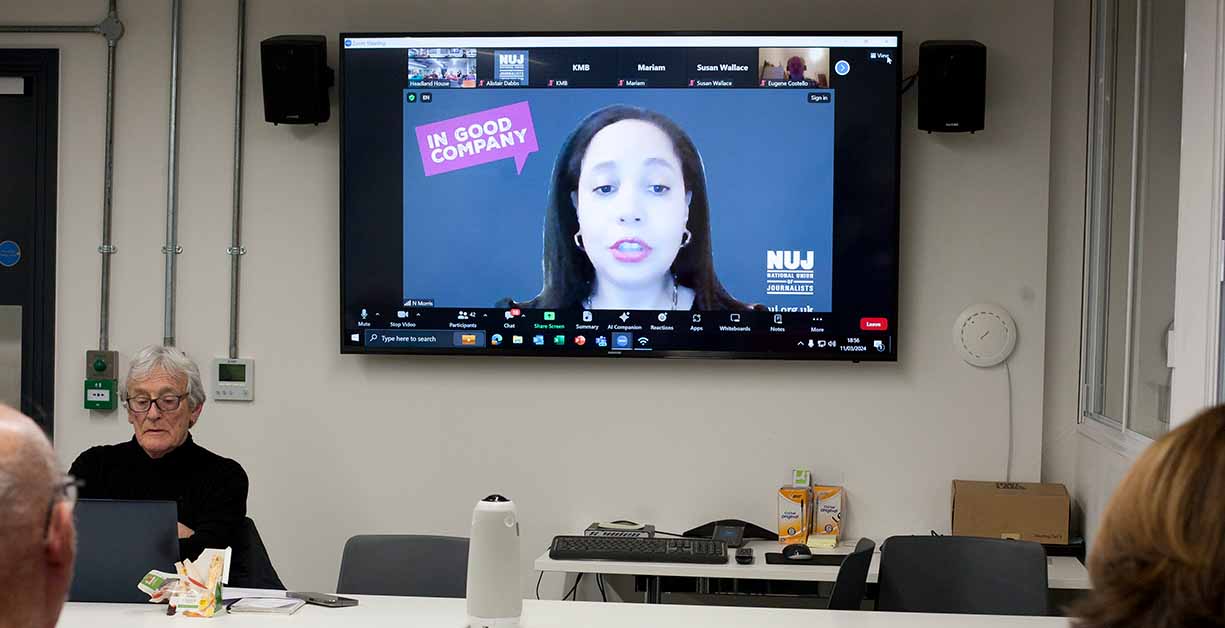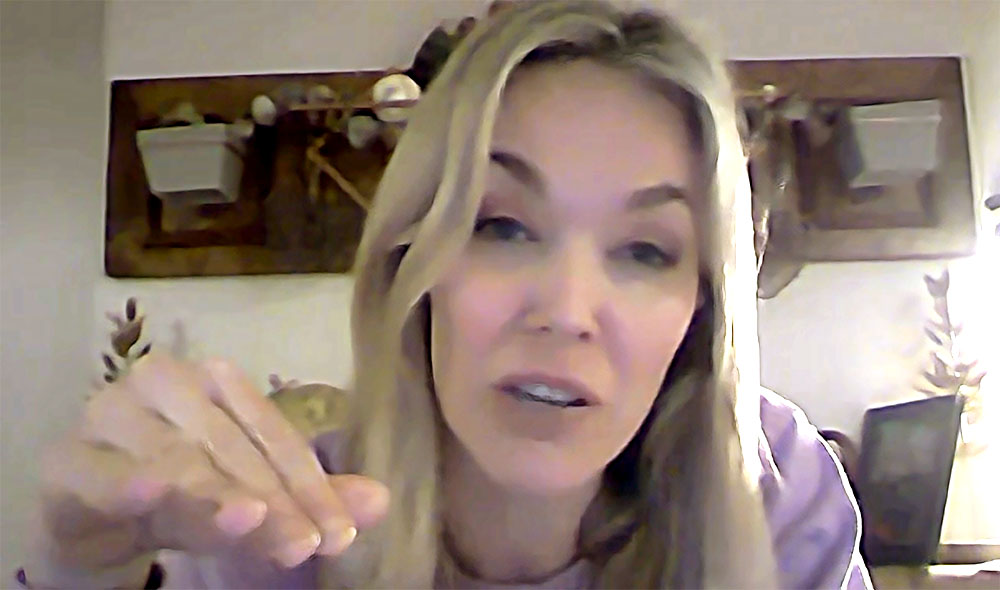‘Nowadays, I would have smacked him’
Stand up, speak out, support each other
Equal pay, sexual harassment and lack of respect in the workplace were among the topics freely discussed at the March meeting of London Freelance Branch, just three days after International Women's Day.

Both speakers – here showing Natasha Morris – joined our regular hybrid meeting over Zoom
Leading the conversation were the NUJ's legal and equality officer Natasha Morris and multi-award-winning freelance journalist Georgie Frost. Natasha detailed the union's work in championing women's rights while Georgie regaled LFB members with toe-curling anecdotes of everything from boorish chauvinism to outright intimidation.
Natasha Morris began by noting some recent NUJ successes in challenging the government over agency worker regulations and actively driving equal pay claims against the BBC, including Samira Ahmed's landmark case. Her department also frequently deals with employment litigation covering areas such as unfair dismissal and discrimination – not just against black and minority ethic members but also those with disabilities, and especially issues affecting women.
To mark International Women's Day, she said, the union's Equality Council launched a campaign aimed at greater pay transparency, requiring employers to indicate a salary range or freelance rate when advertising jobs. "Too often companies still ask applicants to provide their current salary, which routinely disadvantages women."
The campaign also calls on the government not to shelve gender pay gap reporting. The number of equal pay cases that union has had taken on behalf of members has been increasing over recent years, often successfully. This work, she said, encourages women to come forward and ask questions about equal pay. While a gender pay gap is not the same as equal pay, it can certainly be an indication that pay parity is a problem within an organisation. And this can be crucial when the union gets involved in collective pay negotiations.
"There have been many collective victories on behalf of the NUJ's women members, where outcomes include pay increases as well as backdated pay awards in line with their male counterparts," she observed. "In negotiated settlements, for example, the union secured over £2m from late 2020 to 2023 in compensation for members."
It's not just money: it's about challenging the workplace culture and achieving a shift in behaviour on the part of media companies. Sexual harassment and sex-based discrimination in the workplace impacts a disproportionate number of women journalists. A recent report fron UNESCO - the United Nations Educational, Scientific and Cultural Organization - showed that women journalists are particular targets of online harassment and abuse, while black and minority ethnic women journalists face a double whammy.
Natasha outlined the union's involvement with the National Committee for the Safety of Journalists and the imminent launch of an online safety tracker where journalists can report incidents of attack and harassment and intimidation. She observed that the handling of complaints by police needed special attention, joining calls led by Women In Journalism urging police chiefs to step up their efforts to tackle online violence against women journalists.
Following a TUC report on sexual harassment, bullying and verbal abuse suffered by women at work the NUJ has been prioritising its campaign against sexual harassment. It aims to take on cases in workplaces, working to improve companies' policies and procedures to combat the problem and ensuring that they are fit for purpose when it comes to freelance workers.

Even a virulent cold could not prevent Georgie Frost from participating in the meeting, remotely.
Georgie Frost offered some dramatically alternative insights based on her experience as a sports journalist for a decade before she turned to financial journalism. "I've got many stories to tell," she promised – and she delivered.
She began by admitting that she had previously left the NUJ following its disappointing response to a case of pay disparity and bullying sexism of women staff when she worked on a radio show. But she hinted that being invited to say this out loud in front of an LFB meeting might be enough to persuade her to rejoin. "If we are ever going to get to a stage where we can start to stamp out sexism, then we need to have robust conversation."
Georgie observed three areas of sexism while working in the male-dominated sectors of sport and finance: the overt, the covert and the subconscious.
The overt? When she was a sports reporter, a press officer once rang her at 9pm on behalf of a Premier League player to ask if she was single. Apparently the question was phrased: "Does she put it about a bit?" On another occasion, a very famous sports player groped her during an interview. "The worst thing is that I didn't stand up for myself," Georgie admitted. "Nowadays, I would have smacked him."
It even got to the stage where she would be interviewing a sportsman while their teammates would walk past naked, for a laugh. She even had a boss that made wild claims about her private life – one assumes it was intended as "banter" to win approval from peers.
The covert? These are the subliminal insults, such as a football player answering questions from male reporters and then immediately walking away before she had a chance to ask hers. And she said she'd had male friends, colleagues and mentors – those who were supposed to be on her side – put her down when she was booked to go on TV, suggesting she was some sort of airhead ditz rather than a hardened sports hack.
The subconscious? "These are the things that I do to myself," Georgie said. "For example, I have quite a strong voice but over the years I've lowered it." She recounted a recent discussion with a client during which the latter accused her of raising her voice at him. "He just wasn't used to hearing me use the voice I use when I'm speaking with authority – which can be strong."
Yet encouraging women to speak out, she believes, starts with speaking up. "It starts with supporting each other."
At this point, both speakers invited questions from the floor.
Q: Do you think people who witness sexual harassment but say nothing undermine your sense of security generally?
GF: "I 100% agree with you. If one of the men standing near me when I got touched up during that interview had said "That's not acceptable, apologise to her," that would have been so powerful. But I think what people feel is that if I haven't said anything, they won't either, because nobody wants to stand up. Sports journalism is slightly different beast in that everybody is frightened to get on the wrong side of a sports player. If you say the wrong thing, you are banned from going to that club. I've seen it happen, and that's you finished, especially if you're a freelancer. I have sympathy for the guys who remain quiet but just imagine how wonderful it would have felt to me as a twenty-something-year-old if a man had stood up and said "That's not acceptable". Because I wasn't strong enough to do it at the time."
Q: Are there any reports about the impact of AI on women freelancers by the illegal use of their their work?
NM: "We haven't seen any specific cases but we have been doing a lot of work on AI across the union, particularly over data scraping – particularly an issue for freelance journalists who have their copyright infringed regularly."
GF: "I think it's going to be in everybody's field. We're naive if we think that this won't affect us. It's going to shape the way that we think about journalism. Someone said to me the other day when I was at the World Mobile Congress in Barcelona that 'This is going to be bigger than smartphones, this is going to be bigger than the internet'. I mean, wow, that is a statement. That's gonna be our jobs: to make sure what is real, and the more sophisticated it gets, the harder that's going to be."
Q: Is sports reporting a particularly egregious area to work in as a woman?
GF: "Yeah, for sure. The attitude in sport, it comes from the grassroots, all the way through the fans in the stadium to the other journalists. I have never known bitchiness like I'd seen in the male sports pack. It was unbelievable. They would tear the other men down as well. I really hope it has changed but the stories I read would suggest otherwise. I think this comes down to the way we view rich men, rich people, this entitlement among wealthy sports players that they can get away with anything; it is so dependent on money. I don't think this is going to change. Clubs protect those players and the press pack is frightened for their jobs."
Q: Are you really saying that there is statistical evidence that male journalists are paid more than women journalists have the same job? That's illegal!
NM: "Yes, I am saying that. We often take on such cases. Samira Ahmed is a prime example, being paid less than her male counterpart, which is why we were successful in the case. We've had reports of many women journalists that are paid less than their male counterparts for doing the same job or work of equal value. But the legal parameters are quite limited. Whilst we would like the law to be all-encompassing, it often isn't."
GF: "One of the problems with journalism and broadcasting is that there are so many other facets to it. Your experience, what sort of draw you have, how many social media followers you have, can all influence the amount that a media company is willing to pay for you. But women tend not to be quite as bolshy as guys when it comes to demanding more money. We don't quite have the confidence to do that. So what do we need? We need knowledge. If anybody ever asks me how much I get paid, I have no problems telling them. As soon as we can work out how much you and I are getting paid, we can start to go up to our bosses together and say this is not acceptable."
Q: If you are culturally uncomfortable with close physical contact, does that count as sexual harassment?
NM: "That's a really good question. There's quite a lot of work that we do as a movement in terms of training and guidance of union representatives. Keep a lookout for those on the union website and in union notifications. They deal with ways of supporting members and dealing with sexual harassment, not only externally but within the movement itself. We've also worked with the TUC and the Federation of Entertainment Unions. We've drafting and continue to update our guidelines for holding meetings, where they should be held, and so forth."
GF: "I'm quite conservative in the workplace. The idea of someone coming up and hugging me or kissing me is inappropriate for the workplace. But I wouldn't automatically jump to the conclusion that it is sexual harassment. It's important that you lay it out clearly what is comfortable for you, then if you don't feel comfortable, go to your boss. It is about what feels right for you. We need to say to empower women, and employees generally, to speak up when behaviour is not acceptable."
![[Freelance]](../gif/fl3H.png)